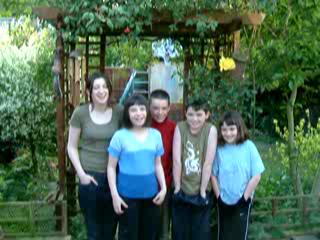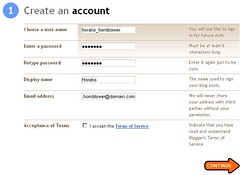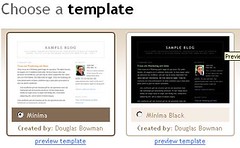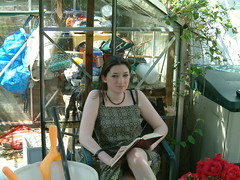Ailish is at her spring dance tonight, sort of an English equivalent of the Prom that's held at the end of their secondary school years and before they start sixth-form college. It's nice cap to a stressful few weeks taking GCSEs. The dress she picked out is beautiful. And, fortunately, she got all of her genes from her mother. I wouldn't look half as good in a dress.
More photos from the event can be found here. Click on any of them to get a larger photo.
Thursday, June 30, 2005
Wednesday, June 29, 2005
Left-Conservative
I came across this Norman Mailer interview via Jay Rosen's PressThink blog. The interview is a couple of years old, but still relevant. In it, Mailer defines himself as a "Left-Conservative." A very good read, even if you don't agree with a thing he says. Mailer remains a powerful thinker.
Rethinking Grokster
Several people have put some real thought into Monday's Supreme Court decision on MGM v Grokster and the thinking seems to be swinging around, or at least calming down. Doc Searls summarizes the nuances:
Joshua Brauer notes that the court in essence affirmed the so-called Betamax decision, which said that the technology wasn't enough, by itself, to make manufacturers liable for illegal actions by users. That's a good thing, and no doubt disappointed the content industry. Still, product makers can still get in trouble if they encourage the infringment. I'm not sure what the line is, though, and neither will your average startup.
(To answer Joshua's paranthetical question, paranthetically, I'm interested in Supreme Court decisions in the U.K. for two reasons: 1) I'm American. 2) What the Americans do affects us way out here, too. Apple's contortions to get on the friendly side of the record companies turns me into a criminal because I want to play my iTunes music, stored on the livingroom PC, on my Linux PC in the bedroom, to take just one example. To do that, I have to crack Apple's digital rights management, a stupid and ineffective waste of time. More and more software and devices are coming with similar roadblocks, almost entirely because of the twists and turns of U.S. courts and legislation.)
More from ReasonOnline:
Grokster has turned out to be the kind of friend that assures the worst enemies. Among those enemies is a Supremely false distinciton between creativity and technology.In other words, there's arrogance on both sides of the debate. You can't completely discount a copyright holder's need to make a living, a position fashionable in some corners of Slashdot.
Joshua Brauer notes that the court in essence affirmed the so-called Betamax decision, which said that the technology wasn't enough, by itself, to make manufacturers liable for illegal actions by users. That's a good thing, and no doubt disappointed the content industry. Still, product makers can still get in trouble if they encourage the infringment. I'm not sure what the line is, though, and neither will your average startup.
At the end of the day I'm not likely to lose too much sleep over a couple of companies who flaunted the law and were called on it. Nor am I concerned that a couple of bad apples are about to spoil the batch of innovation to come. iPod is a perfect example of a technology that has substantial non-infringing uses that has not been marketed as a way to break the law and does not profit from its customers who happen to ignore the company's admonition not to steal music.Brauer's analogy to a gun -- the "HOS Killer" -- doesn't quite work, however. Armor-piercing bullets, and handguns in general, have no other purpose but to kill human beings. They're designed explicitly for it and that's not hidden. Take a look at any gun magazine, for example. And they're still legal.
(To answer Joshua's paranthetical question, paranthetically, I'm interested in Supreme Court decisions in the U.K. for two reasons: 1) I'm American. 2) What the Americans do affects us way out here, too. Apple's contortions to get on the friendly side of the record companies turns me into a criminal because I want to play my iTunes music, stored on the livingroom PC, on my Linux PC in the bedroom, to take just one example. To do that, I have to crack Apple's digital rights management, a stupid and ineffective waste of time. More and more software and devices are coming with similar roadblocks, almost entirely because of the twists and turns of U.S. courts and legislation.)
More from ReasonOnline:
As a technical matter the content companies won MGM v. Grokster; the decision remands the case to a trial court for further factfinding as to whether defendants "induced" infringement. But it's clear that they didn't win anything like what they had been asking the Supremes for—a rule that would penalize any company that made money off a product widely used for infringement, regardless of what the company intended. And though the technical companies and consumer groups are troubled by the outcome in this case, there's still much to encourage them.Technorati Tags: , Copyright, Grokster, Supreme Court, Legal, Filesharing
Monday, June 27, 2005
Google Video goes live
Google has started its video service. You can see the video I uploaded during the service's very early testing stage here:
 .
.
You'll have to download a (very) small program first. The video was taken using our digital camera. And, no, I didn't know how to turn it off, which is why you get a shot of the ground at the end.
Technorati Tags: google, video
 .
.You'll have to download a (very) small program first. The video was taken using our digital camera. And, no, I didn't know how to turn it off, which is why you get a shot of the ground at the end.
Technorati Tags: google, video
Sunday, June 26, 2005
Liam turns 13
I now have three teenagers. Does that mean I'm old? Probably, but I'm also rich. The sun came out for Liam's birthday party and it wasn't as blazingly hot as it has been. Just warm enough. Happy birthday Liam!
You can see more photos of Liam's birthday party here.
[Updated to correct misspelling in the first sentence. Yuck.]
You can see more photos of Liam's birthday party here.
[Updated to correct misspelling in the first sentence. Yuck.]
Saturday, June 25, 2005
Family blogging 101
This is the second in my promised series of "how tos" for using the Internet to keep the family closer together. The first part was on reading blogs with an aggregator.
First, a confession: This web site is a lousy family blog and not a good example to follow. The problem is time. I spend at least 11 hours a day sitting at my desk at work (8-7) and three hours a day (1.5 hours each way) commuting, often working all that time through a Blackberry. What I spend 14 hours a day doing doesn't lend itself to blogging. I'm a news editor, editing stories on court cases throughout Europe. The stories I send on the wire each day are the sum total of what I have to say about what I do at work, and for good reason. I could get myself in a bit of a legal jam if I expressed any opinion on the trials we're covering. A blog would be a libel lawyer's dream. The other two hours of my waking day are spent eating, connecting briefly with my wife and (very briefly) with my children. There's not much left, which is why this blog tends to be about what I read, not what I do.
However, this isn't my only blog. My other one is my stream of photos, along with their captions and titles, on Flickr. (I'll write a "how to" on Flickr next.) That's a record of everyday life in my family, and looks no different in an aggregator such as Bloglines than this Web site. You're seeing our family life, through my eyes. There isn't just one way to blog. Use whatever works for you.
Why blog instead of just emailing each other? That's a good question that isn't simple to answer. Blogging is public. Anyone, anywhere can read what you write, not just your family or friends. I wouldn't take that too seriously. There are tens of millions of blogs. It's unlikely many strangers are going to be interested in your child's school play.
The best analogy is like meeting in a public park. I get into conversations all the time with other parents, or other dog walkers. A shared interest brings people together. You'll find that total strangers on the other side of the world are sometimes very interested in how you got your three-year-old to eat carrots. The other day, I met another Eamon (one 'n' instead of two) Sullivan in London, who found this blog doing a Google search. Another was interested in the few sentences I wrote about a new monitor I bought for one of our PCs and asked whether it could be mounted on a wall. This on a blog with a circulation of four.
Sometimes, however, normal everyday blogs can have a huge impact. One Avon lady wrote about how her eight-year-old was suspended from school for making up his own version of the pledge of allegiance. The story raced all over the world and made her, and the junior trekkie, briefly famous, and the seriously humor-impaired principal briefly infamous. So it's worth remembering that what you write is readable by the world.
I also have a more philosophical reason for encouraging people to blog: It makes the Internet a better place. Again, the park analogy works. When we first moved to London, we lived in a house with a field and a playground across the street. The common area has had it's ups and downs. At one point, it became a hang-out for hundreds of teens, many of them drunk. There was broken glass and graffiti everywhere and the nights were miserable. The neighborhood got up in arms and demanded that the police take action. They did, and it had no effect whatsoever. The crowds would just melt away when the police appeared and reappear afterwards, jeering the cops.
What actually worked was to improve the park, putting in new equipment and giving it some new paint. Parents starting showing up, with their kids. Sober teens showed up to play football in the field. The more people who used the park, the nicer and more inviting it became, encouraging even more to use it.
That, I believe, is as true on the Internet as in a city park. Blogging has, for years, been a small town. Sure, everyone knows each other, but it was also a bit insular and cliquish. The more people who participate, the wider the range of views represented, the more inviting it will be.
Blogging has reminded me of something that my job obscures. The world isn't full of sickos and evil. The vast majority of people are wonderful. Pick a random stranger, anywhere in the world, and have a conversation with them and you would almost certainly have a good time, or at least come away richer for it. The people I read -- ranging from gay libertarians to Avon ladies in Texas -- makes me richer. The more, the better.
As with part one, I'm going to pick one particular blogging software to show you. There are many. I'm picking Google's Blogger because it is fairly easy to use. Others like Microsoft's MSN Spaces. Walt Mossberg at the Wall Street Journal recently said Microsoft's site is easier to use. Personally, I'd avoid it for one of the reasons Mossberg gave for its ease-of-use: it encourages people to use features (such as slide shows) that work only on Microsoft's software. That's the company's business model. It wants you as entangled as possible in Windows and Internet Explorer. You may not believe me now, but you'll want to keep your blog as free from such entanglements as possible. In 10 years, you'll still want to read your blog. You won't be running Windows in 10 years. Trust me on this one.
There are also many other options. Yahoo is developing something. You can also run software on your PC and post your blogs to the Web site that probably came with your Internet connection. Feel free to explore other alternatives.
First, go to http://www.blogger.com in another browser. You'll see a big orange button to click on to sign up like this:

Click on it and fill out the first form with basic information. Then click on the Continue button at the bottom of the form.

The next step is to create a username and password for the blogger account. You may have to try a couple of different usernames. You'll see a message like this if someone is already using that name:

Just keep trying combinations until you get one that works. It doesn't really matter too much, since the username isn't what your blog will be known by, but you should probably pick something that you'll remember, and pick a good password (write it down, if necessary).
Now pick a title for your blog (the words that appear across the top, such as "Eamonn's Home" in this one) and the address of your blog. Mine is just eamonnsullivan.blogspot.com. It's nice to have an unusual name sometimes. Again, you might have to try a few things to get a name for your blog that isn't taken already. Blogger also makes you copy some letters and/or numbers. This is just to ensure that you are a real person and not some computer program trying to create a whole bunch of blogs for advertising.

Now pick a look for your blog. Mine uses the first choice, Minima, while I think Ailish went for Minima Black or something similar. It's up to you, but try to pick something that's easy on the eyes and not hard to read.

That's about it. The next step will just create the blog and then you can start posting. Bookmark the posting page, http://www.blogger.com/home, which where you can create new posts or edit other ones. I won't repeat the information that's already on Blogger, such as its explanation of the Blog Editor, which explains how to write and format an entry. If you can use Word, it isn't that difficult.
One additional step I recommend is to find a button called "BlogThis!", which you can find here. Add it to your Favorites or links bar (which is to the right of the address line in Internet Explorer, or just below it in Firefox). It makes it easy to write a blog about a Web page. Just highlight a quote from the Web page and then click on BlogThis and it will open a posting window with the highlighted text as a quote.
Next, I'll write about Flickr, which makes it easier to add photos to your blog.
Technorati Tags: howto, blogging, family,
First, a confession: This web site is a lousy family blog and not a good example to follow. The problem is time. I spend at least 11 hours a day sitting at my desk at work (8-7) and three hours a day (1.5 hours each way) commuting, often working all that time through a Blackberry. What I spend 14 hours a day doing doesn't lend itself to blogging. I'm a news editor, editing stories on court cases throughout Europe. The stories I send on the wire each day are the sum total of what I have to say about what I do at work, and for good reason. I could get myself in a bit of a legal jam if I expressed any opinion on the trials we're covering. A blog would be a libel lawyer's dream. The other two hours of my waking day are spent eating, connecting briefly with my wife and (very briefly) with my children. There's not much left, which is why this blog tends to be about what I read, not what I do.
However, this isn't my only blog. My other one is my stream of photos, along with their captions and titles, on Flickr. (I'll write a "how to" on Flickr next.) That's a record of everyday life in my family, and looks no different in an aggregator such as Bloglines than this Web site. You're seeing our family life, through my eyes. There isn't just one way to blog. Use whatever works for you.
Why blog instead of just emailing each other? That's a good question that isn't simple to answer. Blogging is public. Anyone, anywhere can read what you write, not just your family or friends. I wouldn't take that too seriously. There are tens of millions of blogs. It's unlikely many strangers are going to be interested in your child's school play.
The best analogy is like meeting in a public park. I get into conversations all the time with other parents, or other dog walkers. A shared interest brings people together. You'll find that total strangers on the other side of the world are sometimes very interested in how you got your three-year-old to eat carrots. The other day, I met another Eamon (one 'n' instead of two) Sullivan in London, who found this blog doing a Google search. Another was interested in the few sentences I wrote about a new monitor I bought for one of our PCs and asked whether it could be mounted on a wall. This on a blog with a circulation of four.
Sometimes, however, normal everyday blogs can have a huge impact. One Avon lady wrote about how her eight-year-old was suspended from school for making up his own version of the pledge of allegiance. The story raced all over the world and made her, and the junior trekkie, briefly famous, and the seriously humor-impaired principal briefly infamous. So it's worth remembering that what you write is readable by the world.
I also have a more philosophical reason for encouraging people to blog: It makes the Internet a better place. Again, the park analogy works. When we first moved to London, we lived in a house with a field and a playground across the street. The common area has had it's ups and downs. At one point, it became a hang-out for hundreds of teens, many of them drunk. There was broken glass and graffiti everywhere and the nights were miserable. The neighborhood got up in arms and demanded that the police take action. They did, and it had no effect whatsoever. The crowds would just melt away when the police appeared and reappear afterwards, jeering the cops.
What actually worked was to improve the park, putting in new equipment and giving it some new paint. Parents starting showing up, with their kids. Sober teens showed up to play football in the field. The more people who used the park, the nicer and more inviting it became, encouraging even more to use it.
That, I believe, is as true on the Internet as in a city park. Blogging has, for years, been a small town. Sure, everyone knows each other, but it was also a bit insular and cliquish. The more people who participate, the wider the range of views represented, the more inviting it will be.
Blogging has reminded me of something that my job obscures. The world isn't full of sickos and evil. The vast majority of people are wonderful. Pick a random stranger, anywhere in the world, and have a conversation with them and you would almost certainly have a good time, or at least come away richer for it. The people I read -- ranging from gay libertarians to Avon ladies in Texas -- makes me richer. The more, the better.
Step by Step
As with part one, I'm going to pick one particular blogging software to show you. There are many. I'm picking Google's Blogger because it is fairly easy to use. Others like Microsoft's MSN Spaces. Walt Mossberg at the Wall Street Journal recently said Microsoft's site is easier to use. Personally, I'd avoid it for one of the reasons Mossberg gave for its ease-of-use: it encourages people to use features (such as slide shows) that work only on Microsoft's software. That's the company's business model. It wants you as entangled as possible in Windows and Internet Explorer. You may not believe me now, but you'll want to keep your blog as free from such entanglements as possible. In 10 years, you'll still want to read your blog. You won't be running Windows in 10 years. Trust me on this one.
There are also many other options. Yahoo is developing something. You can also run software on your PC and post your blogs to the Web site that probably came with your Internet connection. Feel free to explore other alternatives.
First, go to http://www.blogger.com in another browser. You'll see a big orange button to click on to sign up like this:

Click on it and fill out the first form with basic information. Then click on the Continue button at the bottom of the form.

The next step is to create a username and password for the blogger account. You may have to try a couple of different usernames. You'll see a message like this if someone is already using that name:

Just keep trying combinations until you get one that works. It doesn't really matter too much, since the username isn't what your blog will be known by, but you should probably pick something that you'll remember, and pick a good password (write it down, if necessary).
Now pick a title for your blog (the words that appear across the top, such as "Eamonn's Home" in this one) and the address of your blog. Mine is just eamonnsullivan.blogspot.com. It's nice to have an unusual name sometimes. Again, you might have to try a few things to get a name for your blog that isn't taken already. Blogger also makes you copy some letters and/or numbers. This is just to ensure that you are a real person and not some computer program trying to create a whole bunch of blogs for advertising.

Now pick a look for your blog. Mine uses the first choice, Minima, while I think Ailish went for Minima Black or something similar. It's up to you, but try to pick something that's easy on the eyes and not hard to read.

That's about it. The next step will just create the blog and then you can start posting. Bookmark the posting page, http://www.blogger.com/home, which where you can create new posts or edit other ones. I won't repeat the information that's already on Blogger, such as its explanation of the Blog Editor, which explains how to write and format an entry. If you can use Word, it isn't that difficult.
One additional step I recommend is to find a button called "BlogThis!", which you can find here. Add it to your Favorites or links bar (which is to the right of the address line in Internet Explorer, or just below it in Firefox). It makes it easy to write a blog about a Web page. Just highlight a quote from the Web page and then click on BlogThis and it will open a posting window with the highlighted text as a quote.
Next, I'll write about Flickr, which makes it easier to add photos to your blog.
Technorati Tags: howto, blogging, family,
Friday, June 24, 2005
Put the bets in early
Every year in London the bookmakers make a killing on a sucker's bet: Whether there will be a white Christmas. We do get snow in London, but I've only seen it much later. The weather we normally have at Christmas is closer to what we would see at Thanksgiving in the Boston area. Hamish Newlands noticed this posting on Jerry Pornelle's site, saying that it looks like the Gulf Stream is shutting down. It's all very hush-hush, unidentified sources stuff, but I'll be watching out for that article in Nature. And maybe I'll make a bet.
Current Chaos Manor mail: "[T]he northern branch of the Gulf Stream is shutting down now, with climate consequences likely as soon as this winter. An informed guess of the likely effects - I won't characterize it as more than that - is a return in northwest Europe and northeast North America to the sort of winters seen from the fourteenth through the eighteenth centuries, when the historical record shows at various points the Hudson freezing over solidly enough to transport massive cannon from Fort Ticonderoga, the Thames freezing over in London, the brackish polders of Holland freezing over, and a variety of bad weather, short growing seasons, and crop failures."
More blogs on similar subjects (via Technorati): Global Warming, Climate Change, Weather
Current Chaos Manor mail: "[T]he northern branch of the Gulf Stream is shutting down now, with climate consequences likely as soon as this winter. An informed guess of the likely effects - I won't characterize it as more than that - is a return in northwest Europe and northeast North America to the sort of winters seen from the fourteenth through the eighteenth centuries, when the historical record shows at various points the Hudson freezing over solidly enough to transport massive cannon from Fort Ticonderoga, the Thames freezing over in London, the brackish polders of Holland freezing over, and a variety of bad weather, short growing seasons, and crop failures."
More blogs on similar subjects (via Technorati): Global Warming, Climate Change, Weather
Thursday, June 23, 2005
Foresight of Douglas Adams
Douglas Adams, writing in the Times in 1999, said we should Stop Worrying and Learn to Love the Internet. It's remarkable how right he got it. Read it. What really struck me is his comments on the progression of people's attitude to technology:
"I suppose earlier generations had to sit through all this huffing and puffing with the invention of television, the phone, cinema, radio, the car, the bicycle, printing, the wheel and so on, but you would think we would learn the way these things work, which is this:
1) everything that’s already in the world when you’re born is just normal;
2) anything that gets invented between then and before you turn thirty is incredibly exciting and creative and with any luck you can make a career out of it;
3) anything that gets invented after you’re thirty is against the natural order of things and the beginning of the end of civilisation as we know it until it’s been around for about ten years when it gradually turns out to be alright really.
Apply this list to movies, rock music, word processors and mobile phones to work out how old you are."
Monday, June 20, 2005
Patent absurdity
Richard Stallman, perhaps being a little less-than-diplomatic, rips apart a French politician's use of Victor Hugo in defense of software patents. I've had a conversation with Mr. Stallman, many years ago. I'd make one suggestion: Make darn sure you have your facts straight before taking him on.
More blogs on the subjects (via Technorati): Software Patents, European Union
More blogs on the subjects (via Technorati): Software Patents, European Union
Interesting experiment in flexible copyright
I put in an order, via a bookstore in North London, for a signed copy of Cory Doctorow's latest sci-fi novel, Someone Comes to Town, Someone Leaves Town. I've not read any of his books, but I thoroughly enjoy his blog posts. He's an activitist for fairer copyright and patent laws, so he's putting his money where his mouth is:
"This book is the first novel to employ the new Creative Commons Developing Nations License. That's a license that lets anyone living in a country that's not on the World Bank's list of high-income countries treat the book as if it were in the public domain. "
"This book is the first novel to employ the new Creative Commons Developing Nations License. That's a license that lets anyone living in a country that's not on the World Bank's list of high-income countries treat the book as if it were in the public domain. "
Sunday, June 19, 2005
Snapshot of a Hot Fathers Day
I'm typing this while sitting out in the garden. It's hot -- about 32C (over 90F). We can't go anywhere far because Theresa is working, so the kids are finding ways to cope. Aidan and Cara played a bit of basketball with a sprinkler going in the middle.
I'm having a nice quiet father's day. It would be better if Theresa were here. She's doing her seventh straight day at work, but then she'll get several days off in a row (I hope).
Ailish skipped the sprinkler and is reading as I speak, in a shady corner:

Shana's playing with a homemade bow and arrow, which fortunately doesn't shoot far:

And the dog is doing what dogs do, sleeping:

I'm having a nice quiet father's day. It would be better if Theresa were here. She's doing her seventh straight day at work, but then she'll get several days off in a row (I hope).
Ailish skipped the sprinkler and is reading as I speak, in a shady corner:

Shana's playing with a homemade bow and arrow, which fortunately doesn't shoot far:

And the dog is doing what dogs do, sleeping:

Saturday, June 18, 2005
What are blogs?
My wife Theresa is going to the U.S. next month for a few days. I'm hoping she'll have better luck than I've had at spreading the word about the technology available for keeping our far-flung relations closer. So I'm going to write a few, very basic "How To" essays on this blog for the next couple of weeks, which hopefully she can use to spread the word.
First, here's the situation now:
Once you get the hang of them, you can keep all of us up-to-date on what's happening with you and what you're seeing and experiencing, and we can keep you up-to-date on us, in just a few minutes a day or week.
What is a Blog?
A blog, which is short for Web Log, isn't just a Web site, although most are also Web sites, set up in a different way. The Web site of a blog normally has the newest information at the top, with older material pushed lower down on the page over time (where it eventually migrates off into an archive of some sort) as new material is added.
But to really understand why blogs are useful, you have to forget about the Web site. A blog is a stream of information -- primarily made of words, but also photos, audio and even video. In the jargon, that stream is called a "feed." You read or view blogs by subscribing (like a newspaper) to those streams of information or feeds, usually using a reader, or a so-called aggregator. This is what makes a blog different. New information comes to you, you don't have to go to it.
Bloglines is a fairly typical aggregator, except that it's located on a Web page, so you don't have to install any software. You can also read the information you've subscribed to anywhere where there's an Internet connection and a browser, such as Internet Explorer or Firefox.
Step One: Sign Up.
Open http://www.bloglines.com in another browser window (i.e., choose New Window under the File menu and copy and paste the address in that window. Look for the "Sign up now" words in the middle of the screen, like this:

You'll see a form like this that you have to fill out:

Once you've filled it out, click on Register. You'll have to reply to the email they send you before you're fully registered. The email usually comes within a minute or so. Just follow the directions. If I remember correctly (it has been a long time), you just have to click on a Web link.
Once registered, bookmark Bloglines. Do it now, before you forget. In Internet Explorer, for example, click on the Favorites menu and then Add to Favorites.
In fact, you may even want to make it your home page. Most of the Web sites you visit probably have a feed that you can subscribe to, allowing you to view the information without most of the annoying advertisements and other junk. But we'll get into that next.
Step Two: Subscribe to Feeds.
The next thing you want to do after you've bookmarked Bloglines (you've done that already, right?) is add a bookmark for subscribing to feeds. If you don't see the following page when you first register with Bloglines, click on the word "Add" that appears at the top left, right under "My Feeds," then click on the link to the "Easy Subscribe Button."

Just do what it says on the page, depending on what you're using for a browser. On Internet Explorer, right click on the button with the mouse and choose "Add to Favorites."
So let's add a few feeds. First, in the browser where Bloglines is running, go to my blog: http://eamonnsullivan.blogspot.com. Now, choose the "Sub with Bloglines" bookmark you just made. Bloglines searches the page looking for feeds. It'll find two. It doesn't really matter which one you choose. You can preview how the feed will look in Bloglines or just put a tickmark next to the one of the boxes next to "Subscribe to this Feed" and then click on the Subscribe button at the bottom of the page.
You should be back to Bloglines. My feed is now one of the choices on the left. Click on it and you'll see my posts, in reverse chronological order. If there's a long one that you would like to read later, you can tick the "Keep as New" option at the bottom of the post. Otherwise, the next time you click on my blog's feed, you'll only see new posts. You can get to the Web page at any time by clicking on the title (I think it's "Eamonn's Home" or "Eamonn's Thoughts") near the top of the post's page on the right.
Let's add another of Ailish's photos. Copy and paste this address into the browser's address window: http://www.flickr.com/photos/28895332@N00/
Now do the same thing: Choose "Sub with Bloglines" and then subscribe. You'll see two choices again, probably. It doesn't matter which one you pick. (There are two formats for feeds used, so many Web sites provide both.)
When you click on the feed, you'll see Ailish's pictures, along with the captions she writes for them, as they come in. Notice that there really isn't any difference between my feed and Ailish's, other than the content, as far as Bloglines is concerned. They're just feeds, even though one is a traditional "blog" and the other is just a collection of photos. It's just a stream of information.
Let's pick one to show you how Bloglines can be used to subscribe to the content on a normal Web page. One site I visit frequently is the BBC News coverage of science and nature, which is here:
http://news.bbc.co.uk/1/hi/sci/tech/default.stm
Copy and paste that into the browser running Bloglines, choose "Sub with Bloglines" and then subscribe. Now you'll get a feed of every science story that the BBC posts.
To find other blogs that may interest you, you can try a blog index Web site, such as Technorati. Technorati organizes blogs using key words, or "tags." For example, to find blog posts about Catholicism, you'd go here.
If you read a post that interests you, subscribe to it in the usual way. I found this gem the other day, and got to share in the day of someone going to Mass in Nashua.
The World's Biggest City
Before you read the Technorati feeds , a few words about the "blogosphere" (the collection of blogs around the world): It's like the world's largest city. People are speaking a huge number of languages and expressing views of all sorts. Yes, there's even the homeless guy having what sounds like a violent argument with his imaginary friend... That's the world. If you don't like the viewpoint, just don't read it.
But that diversity is also why I love blogs. There are millions of people sharing their thoughts around the world, all expressing different views, showing you sights you'll probably never see in person. Welcome to the world.
In the next post, I'll explore how to start your own feed.
Technorati Tags: blogging, howto, tutorials
Link
First, here's the situation now:
- I know a lot more about the day-to-day lives of strangers whose blogs I read than I do about my sisters or in-laws.
- I see photos every day on Flickr of people I've never met in person, or who are at best vague acquaintances, but I don't know what my nieces and nephews look like in a soccer uniform, or even what they look like now. I haven't seen some of them in years.
- Skype would enable my family to talk frequently and for as long as we want, for free, but the only people who call me are strangers in China, Russia or Morocco who want to practice their English so that they can get a job in the U.K.
Once you get the hang of them, you can keep all of us up-to-date on what's happening with you and what you're seeing and experiencing, and we can keep you up-to-date on us, in just a few minutes a day or week.
What is a Blog?
A blog, which is short for Web Log, isn't just a Web site, although most are also Web sites, set up in a different way. The Web site of a blog normally has the newest information at the top, with older material pushed lower down on the page over time (where it eventually migrates off into an archive of some sort) as new material is added.
But to really understand why blogs are useful, you have to forget about the Web site. A blog is a stream of information -- primarily made of words, but also photos, audio and even video. In the jargon, that stream is called a "feed." You read or view blogs by subscribing (like a newspaper) to those streams of information or feeds, usually using a reader, or a so-called aggregator. This is what makes a blog different. New information comes to you, you don't have to go to it.
Bloglines is a fairly typical aggregator, except that it's located on a Web page, so you don't have to install any software. You can also read the information you've subscribed to anywhere where there's an Internet connection and a browser, such as Internet Explorer or Firefox.
Step One: Sign Up.
Open http://www.bloglines.com in another browser window (i.e., choose New Window under the File menu and copy and paste the address in that window. Look for the "Sign up now" words in the middle of the screen, like this:

You'll see a form like this that you have to fill out:

Once you've filled it out, click on Register. You'll have to reply to the email they send you before you're fully registered. The email usually comes within a minute or so. Just follow the directions. If I remember correctly (it has been a long time), you just have to click on a Web link.
Once registered, bookmark Bloglines. Do it now, before you forget. In Internet Explorer, for example, click on the Favorites menu and then Add to Favorites.
In fact, you may even want to make it your home page. Most of the Web sites you visit probably have a feed that you can subscribe to, allowing you to view the information without most of the annoying advertisements and other junk. But we'll get into that next.
Step Two: Subscribe to Feeds.
The next thing you want to do after you've bookmarked Bloglines (you've done that already, right?) is add a bookmark for subscribing to feeds. If you don't see the following page when you first register with Bloglines, click on the word "Add" that appears at the top left, right under "My Feeds," then click on the link to the "Easy Subscribe Button."

So let's add a few feeds. First, in the browser where Bloglines is running, go to my blog: http://eamonnsullivan.blogspot.com. Now, choose the "Sub with Bloglines" bookmark you just made. Bloglines searches the page looking for feeds. It'll find two. It doesn't really matter which one you choose. You can preview how the feed will look in Bloglines or just put a tickmark next to the one of the boxes next to "Subscribe to this Feed" and then click on the Subscribe button at the bottom of the page.
You should be back to Bloglines. My feed is now one of the choices on the left. Click on it and you'll see my posts, in reverse chronological order. If there's a long one that you would like to read later, you can tick the "Keep as New" option at the bottom of the post. Otherwise, the next time you click on my blog's feed, you'll only see new posts. You can get to the Web page at any time by clicking on the title (I think it's "Eamonn's Home" or "Eamonn's Thoughts") near the top of the post's page on the right.
Let's add another of Ailish's photos. Copy and paste this address into the browser's address window: http://www.flickr.com/photos/28895332@N00/
Now do the same thing: Choose "Sub with Bloglines" and then subscribe. You'll see two choices again, probably. It doesn't matter which one you pick. (There are two formats for feeds used, so many Web sites provide both.)
When you click on the feed, you'll see Ailish's pictures, along with the captions she writes for them, as they come in. Notice that there really isn't any difference between my feed and Ailish's, other than the content, as far as Bloglines is concerned. They're just feeds, even though one is a traditional "blog" and the other is just a collection of photos. It's just a stream of information.
Let's pick one to show you how Bloglines can be used to subscribe to the content on a normal Web page. One site I visit frequently is the BBC News coverage of science and nature, which is here:
http://news.bbc.co.uk/1/hi/sci/tech/default.stm
Copy and paste that into the browser running Bloglines, choose "Sub with Bloglines" and then subscribe. Now you'll get a feed of every science story that the BBC posts.
To find other blogs that may interest you, you can try a blog index Web site, such as Technorati. Technorati organizes blogs using key words, or "tags." For example, to find blog posts about Catholicism, you'd go here.
Before you read the Technorati feeds
But that diversity is also why I love blogs. There are millions of people sharing their thoughts around the world, all expressing different views, showing you sights you'll probably never see in person. Welcome to the world.
In the next post, I'll explore how to start your own feed.
Technorati Tags: blogging, howto, tutorials
Link
Ailish's photos
My daughter Ailish has a real talent with the camera, much more than I ever did. Her latest batch is of the various flowers around our garden. She shares one defect with me, though. Neither one of us have any idea what these flowers are actually called...
Check out all her photos here.
Check out all her photos here.
Friday, June 17, 2005
I'm Translucent
And not just because I spend 12 hours a day in an office and don't get any sun. Apparently, I'm part of the Translucent Generation.
If you can get past the silliness and hyperbole, there's some interesting ideas in this essay:
If you can get past the silliness and hyperbole, there's some interesting ideas in this essay:
The translucent generation is made up of those whose values, beliefs, and ideals have been shaped by their dynamic use of the Internet. There are lots of twenty year olds today who use the Internet daily, and a few who have used it since they were old enough to read. Of those even fewer are power users; the web logging, Usenet posting, wiki editing, IRC chatting types. And of those power users, very few were engaged in these activities during their formative years. Those elite few share a unique value set that will revolutionize the world. And because these values spread virally, the size of this generation will continue to grow exponentially.
Thursday, June 16, 2005
Steve Jobs' Stanford Commencement Speech
I'm not sure that someone who dropped out of college after six months would have been my first choice to give a commencement speech, but Steve Jobs' address sure was a good one. A Sample:
You've got to find what you love, and that is as true for work as it is for your lovers. Your work is going to fill a large part of your life, and the only way to be truly satisfied is to do what you believe is great work, and the only way to do great work is to love what you do. If you haven't found it yet, keep looking, and don't settle. As with all matters of the heart, you'll know when you find it, and like any great relationship it just gets better and better as the years roll on. So keep looking. Don't settle.The whole thing is worth reading.
Wednesday, June 15, 2005
Reality Economics
I watched "The Best Bits of Dragon's Den" on the BBC last night -- as the title indicates, this was a "best of," little snippets of the television series. I'm sorry I missed the whole thing. This is one reality TV show I'd enjoy.
Basically, entrepreneurs made a pitch to five well-known investors for money. The "Dragon's Den" in the title refers to the room where the venture capitalists sit, with piles of cash in front of them, listening to presentations from the hopefuls. The deals, and the money, are real.
The rules are that the contestant must come away with all that they asked for, or none at all. For example, the first petitioner was asking for something like 150,000 pounds ($270,000) for an equity stake in a company to make a gadget for rocking a baby to sleep. If he got two bites, say for 50,000 pounds each, and not a third, he'd go away with nothing.
That system gave the investors a lot of leverage. First, the money-people are all in the same room, so they know who they are competing against, and for how much. Second, knowing that it's all or nothing, the bidders were able to play off each other for higher equity stakes.
One entrepreneur, who plans to set up vending machines at London Underground stations to sell umbrellas, was trying to sell 20 percent of his business for 150,000 pounds. One investor offered 75,000 for a 22 percent stake and another matched that. The businessman would get his money, but at the cost of giving up a lot of control. Negotiate? What for? The only other choice is to walk away.
The umbrella guy did manage to claw back 4 percent with the one weapon available to the entrepreneurs: peer pressure. Seeing that the petitioner was seriously considering just walking away, one of the bidders offered a token: He'll give him 75,000 pounds for 20 percent, instead of 22 percent. The other bidder -- I believe it was Duncan Bannatyne, a health club mogul, refused to budge, demanding 22 percent at the same price. Reluctantly, umbrella guy agreed to both and left the room.
The incident caused a rift in the investors. "I don't think I'll work with you ever again," says the first bidder, who (again, I wasn't taking notes) I believe was Peter Jones of Phones International. Mr. Bannatyne had just screwed both the entrepreneur and his fellow investor in the venture, Mr. Jones says. Not cool.
Faced with a loss of reputation on national television, Mr. Bannatyne caved quickly. He called the umbrella guy back in the room and gave up his extra 2 percent.
Trust and reputation, as the umbrella episode illustrated, was more important than the business plan in many deals. The successful petitioners won backing because they came across as someone the investors would feel comfortable working with, not because they gave the slickest presentation. One contestant lost because he cut off a questioner and tried to claim he had contracts with two well-known companies. A closer looked showed that the "contracts" were actually just quotations, promises to provide a service at a certain price. (This petitioner also spoke almost entirely in jargon, and I still don't know what he was trying to do.)
One final aspect that jumped out at me was the biases of the producers. The advertisements for the show portrayed the investors as monsters, making the hapless entrepreneurs squirm under withering personal attacks. But when all that squirming and criticism was put into context, the investors came across as savvy, intelligent people, and even sympathetic. One segment shown repeatedly in trailers was the guy trying to sell a gadget that rocks babies to sleep. He's shown sweating profusely and stammering. And he did, but all on his own, with the investors all the while trying to put him at ease -- offering to ask questions, instead of letting the poor guy suffer through a presentation that was failing.
Still, despite its biases and some questionable rules, the show worked as a microcosm of the business world. Business is built on trust and reputation, with a dash of peer pressure, at least when it's working the way it should.
[Updated to add link to the show and correct the number of investors.]
More blogs on similar subjects (via Technorati): Reality TV, entrepreneurship, Venture Capital
Basically, entrepreneurs made a pitch to five well-known investors for money. The "Dragon's Den" in the title refers to the room where the venture capitalists sit, with piles of cash in front of them, listening to presentations from the hopefuls. The deals, and the money, are real.
The rules are that the contestant must come away with all that they asked for, or none at all. For example, the first petitioner was asking for something like 150,000 pounds ($270,000) for an equity stake in a company to make a gadget for rocking a baby to sleep. If he got two bites, say for 50,000 pounds each, and not a third, he'd go away with nothing.
That system gave the investors a lot of leverage. First, the money-people are all in the same room, so they know who they are competing against, and for how much. Second, knowing that it's all or nothing, the bidders were able to play off each other for higher equity stakes.
One entrepreneur, who plans to set up vending machines at London Underground stations to sell umbrellas, was trying to sell 20 percent of his business for 150,000 pounds. One investor offered 75,000 for a 22 percent stake and another matched that. The businessman would get his money, but at the cost of giving up a lot of control. Negotiate? What for? The only other choice is to walk away.
The umbrella guy did manage to claw back 4 percent with the one weapon available to the entrepreneurs: peer pressure. Seeing that the petitioner was seriously considering just walking away, one of the bidders offered a token: He'll give him 75,000 pounds for 20 percent, instead of 22 percent. The other bidder -- I believe it was Duncan Bannatyne, a health club mogul, refused to budge, demanding 22 percent at the same price. Reluctantly, umbrella guy agreed to both and left the room.
The incident caused a rift in the investors. "I don't think I'll work with you ever again," says the first bidder, who (again, I wasn't taking notes) I believe was Peter Jones of Phones International. Mr. Bannatyne had just screwed both the entrepreneur and his fellow investor in the venture, Mr. Jones says. Not cool.
Faced with a loss of reputation on national television, Mr. Bannatyne caved quickly. He called the umbrella guy back in the room and gave up his extra 2 percent.
Trust and reputation, as the umbrella episode illustrated, was more important than the business plan in many deals. The successful petitioners won backing because they came across as someone the investors would feel comfortable working with, not because they gave the slickest presentation. One contestant lost because he cut off a questioner and tried to claim he had contracts with two well-known companies. A closer looked showed that the "contracts" were actually just quotations, promises to provide a service at a certain price. (This petitioner also spoke almost entirely in jargon, and I still don't know what he was trying to do.)
One final aspect that jumped out at me was the biases of the producers. The advertisements for the show portrayed the investors as monsters, making the hapless entrepreneurs squirm under withering personal attacks. But when all that squirming and criticism was put into context, the investors came across as savvy, intelligent people, and even sympathetic. One segment shown repeatedly in trailers was the guy trying to sell a gadget that rocks babies to sleep. He's shown sweating profusely and stammering. And he did, but all on his own, with the investors all the while trying to put him at ease -- offering to ask questions, instead of letting the poor guy suffer through a presentation that was failing.
Still, despite its biases and some questionable rules, the show worked as a microcosm of the business world. Business is built on trust and reputation, with a dash of peer pressure, at least when it's working the way it should.
[Updated to add link to the show and correct the number of investors.]
More blogs on similar subjects (via Technorati): Reality TV, entrepreneurship, Venture Capital
Tuesday, June 14, 2005
Morning walks
The most peaceful moments of my day recently have been morning walks with the dog. I don't do it enough. Dude loves it and an hour of just listening to birds sing is an excellent start to the day.
Sunday, June 12, 2005
Science and religion
Jeff Duntemann, in his blog, recently said advocates of creatonism and its more recent successor, "Intelligent Design" (the belief that nature is so complex that it had to have been designed, rather than evolved by chance), simply aren't thinking big enough.
I'd go a little further: I believe strongly that everything in the universe is discoverable, from its formation, to the workings of cells, to the chemistry behind emotions and reasoning. The universe is open source, to be tech geeky about it. That belief, for me, is even more strongly held than my own religion, Catholicism. That's not blasphemous, nor does it diminish my faith. Science is something you can touch and test. Religion isn't. For all I know, Buddhism or Islam could be the One True Religion. I just happened to have been born a Catholic. There's really no way of telling. It's just faith.
It isn't necessary to believe in God, or deny God, to understand nature. You could have complete understanding of the universe and still be no closer to saying whether there is a God or not. To believe that science threatens religion is to limit God.
Arthur C. Clarke once said, "Any sufficiently advanced technology is indistinguishable from magic." I agree, but I think you can carry that further: The work of any divinity worthy of the name would be indistinguishable from nature. Seamless, coherent and understandable.
Believing that we can understand how God intervenes in the universe smacks of hubris. I agree with Richard Dawkins, an athiest, that the aim of creationism and its cousins is to embrace mystery, rather than solve them.
More blogs on similar subjects (via Technorati): Creationism, Intelligent+Design, Religion, Science
It's really a failure of imagination. The God that I can imagine is immense, unthinkably immense, such that the Drumlin Number (2^256, or 1.45E77; think about it!) vanishes by comparison. A God that big can think and act across dimensions of space and time that mean virtually nothing to us. A God that big can do more than just wave His wand and say, 'Let there be light!' A God that big can set in motion processes that, across the eons, echo and echo with comprehensible wonder.
This allows the God that I can imagine to be generous. While devising our creation, he kicked back and said to Himself, 'Whoa! This is cool! I'm going to allow this to happen such that my forthcoming children can work out the mechanisms that I use, and thus share the experience of Creating with me. This is something they're going to want to see!'
I'd go a little further: I believe strongly that everything in the universe is discoverable, from its formation, to the workings of cells, to the chemistry behind emotions and reasoning. The universe is open source, to be tech geeky about it. That belief, for me, is even more strongly held than my own religion, Catholicism. That's not blasphemous, nor does it diminish my faith. Science is something you can touch and test. Religion isn't. For all I know, Buddhism or Islam could be the One True Religion. I just happened to have been born a Catholic. There's really no way of telling. It's just faith.
It isn't necessary to believe in God, or deny God, to understand nature. You could have complete understanding of the universe and still be no closer to saying whether there is a God or not. To believe that science threatens religion is to limit God.
Arthur C. Clarke once said, "Any sufficiently advanced technology is indistinguishable from magic." I agree, but I think you can carry that further: The work of any divinity worthy of the name would be indistinguishable from nature. Seamless, coherent and understandable.
Believing that we can understand how God intervenes in the universe smacks of hubris. I agree with Richard Dawkins, an athiest, that the aim of creationism and its cousins is to embrace mystery, rather than solve them.
The creationists’ fondness for “gaps” in the fossil record is a metaphor for their love of gaps in knowledge generally. Gaps, by default, are filled by God. You don’t know how the nerve impulse works? Good! You don’t understand how memories are laid down in the brain? Excellent! Is photosynthesis a bafflingly complex process? Wonderful! Please don’t go to work on the problem, just give up, and appeal to God. Dear scientist, don’t work on your mysteries. Bring us your mysteries for we can use them. Don’t squander precious ignorance by researching it away. Ignorance is God’s gift to Kansas.
More blogs on similar subjects (via Technorati): Creationism, Intelligent+Design, Religion, Science
Friday, June 10, 2005
Voice of experience
Hamish (don't know his last name), who lived in London for 10 years, hits the nail just right in his description of why it doesn't work:
I don't have to imagine it, unfortunately.
Now, all cities have their problems, but London is what you get when you have a mediaeval streetplan, Georgian Buildings, Victorian Sewers, Edwardian Subways and Third World traffic levels.
Then in order to try and make it all hang together, you let the socialists run it in the sixities, seventies, and early eighties, and when that kinda doesn't work, you make the whole thing an ideaological exercise in testing the free market.
Imagine the result.
Thursday, June 09, 2005
Wait or not?
It has been three days since Apple's announcement that it is switching to Intel processors and I'm still not sure whether I'm going to wait until I buy a new Mac. I'm leaning toward making the jump to a G5 iMac around Christmas time, even though it's going to be a "legacy" platform.
My reasoning is that a main PC's life is about two or three years (after that I put Linux on it and it moves to a backroom somewhere). By the time I'm ready for a new one, Apple will have sorted out most of the early glitches in its move to a new processor and I'll have had given my wife and kids (total Mac newbies) a couple of years to learn their way around.
Dan Gillmor says he would have waited:
But would you really want to be an early tester of Apple's first foray on Intel?
[Update: David Rogers says he'll also probably buy a G5 iMac and isn't worried about the move to Intel. "As long as they aren't required to display that cheesy "intel inside" logo, I'll be happy," he writes. "If they do, I'll be strongly inclined to fly to Cupertino and personally kick Steve Jobs' ass."]
More blogs on similar subjects (via Technorati): Apple, Intel, Mac
My reasoning is that a main PC's life is about two or three years (after that I put Linux on it and it moves to a backroom somewhere). By the time I'm ready for a new one, Apple will have sorted out most of the early glitches in its move to a new processor and I'll have had given my wife and kids (total Mac newbies) a couple of years to learn their way around.
Dan Gillmor says he would have waited:
A big question is whether sales of current Macs will drop off. I would not have purchased my month-old Powerbook, for example, had I known this was in the works. I would have added some memory and used the machine for another year, waiting for the sub-notebook machine I (and lots of other people) would prefer to use.
But would you really want to be an early tester of Apple's first foray on Intel?
[Update: David Rogers says he'll also probably buy a G5 iMac and isn't worried about the move to Intel. "As long as they aren't required to display that cheesy "intel inside" logo, I'll be happy," he writes. "If they do, I'll be strongly inclined to fly to Cupertino and personally kick Steve Jobs' ass."]
More blogs on similar subjects (via Technorati): Apple, Intel, Mac
Wednesday, June 08, 2005
Free Press News : CNN stuns U.S. with actual news
CNN International is what runs on one of the screens in front of me at work. It's pretty good, not the fastest by any means, but not bad for TV and fairly in-depth. I caught this article, which surprised me. Is CNN really limiting their best stuff to the overseas audience? How peculiar.
Sunday, June 05, 2005
Apple to ditch IBM, switch to Intel chips | CNET News.com
I'll be watching with interest on Monday to see if CNET is correct that Apple plans to switch to Intel chips . But I think people are overestimating the difficulty of this move. It wouldn't be anywhere near as difficult as the transition from Motorola's 68K processor to the PowerPC. Apple's software is now based on an open source operating system, which happens to already be available on Intel's processors.
It won't be dead simple, and Steve Jobs will have a challenge to keep people like me (who planned on buying a Mac as soon as possible) from just waiting, but for most application developers it will be a relatively easy switch. They'll have to recompile, test for endian issues and rewrite any very low-level hacks. That's not anywhere near as bad as last time, when programmers were moving to a new operating system at the same time.
What's very interesting about this, if true, is that Apple is about to put the business value of open source to its first big test. The company is in its best position in a decade to take on Microsoft directly, as the behemouth makes a difficult transition to Longhorn, the next version of Windows. Because Apple built its crown jewel (Mac OS X) on an open platform, the company is able to maneuver quickly, arriving at Longhorn's destination before Microsoft.
More blogs on similar subjects (via Technorati): apple, software, mac, computers
It won't be dead simple, and Steve Jobs will have a challenge to keep people like me (who planned on buying a Mac as soon as possible) from just waiting, but for most application developers it will be a relatively easy switch. They'll have to recompile, test for endian issues and rewrite any very low-level hacks. That's not anywhere near as bad as last time, when programmers were moving to a new operating system at the same time.
What's very interesting about this, if true, is that Apple is about to put the business value of open source to its first big test. The company is in its best position in a decade to take on Microsoft directly, as the behemouth makes a difficult transition to Longhorn, the next version of Windows. Because Apple built its crown jewel (Mac OS X) on an open platform, the company is able to maneuver quickly, arriving at Longhorn's destination before Microsoft.
More blogs on similar subjects (via Technorati): apple, software, mac, computers
Saturday, June 04, 2005
File-Sharing Pioneer Turns to Free Internet Calling
There's a good article today in the Washington Post on Niklas Zennstrom and his company, Skype:
I'm not surprised Skype is successful. It's wonderful software. It just works, simply. I used it again last night to chat with a university student in Moscow. This is the future, without a doubt.
But I wonder if Skype will be the success of Internet phones. I've been using and evangelizing about Skype for more than year. Not a single one of my relatives will use it, and I know of only two people I work with (soon to be three) who are Skypers. Most of the time, I'm either talking to strangers or using the pay service SkypeOut, which allows me to call regular phones cheaply.
As with Mr. Zennstrom's previous venture, Kazaa, Skype appeals to the early adopters, the adventurous. For sure, there are a lot more of those kinds of people these days. But the trick will be getting more average people to try it. What may happen is that the big phone companies wake up, smell the roses, and start offering something vaguely similar. Which is my Mom & Dad more likely to use, something from AT&T or from a Swede with a couple hundred employees in London and Estonia? I hope they pick the Swede, because it would be good for the world, for capitalism and for the Internet. But I'm not holding out much hope.
More blogs on similar subjects (via Technorat): skype, voip
In just 18 months, Skype has become a global telephone firm with 40 million users, making it not just the fastest-growing telecommunications company in the world but one of the fastest-growing businesses of any kind.
By contrast, other voice-over-Internet providers, which charge a monthly fee and use different technology, have fewer than 3 million customers combined. Skype is acquiring as many new customers in a week as the best known voice-over-Internet company, Vonage Holdings Corp., has in total.
I'm not surprised Skype is successful. It's wonderful software. It just works, simply. I used it again last night to chat with a university student in Moscow. This is the future, without a doubt.
But I wonder if Skype will be the success of Internet phones. I've been using and evangelizing about Skype for more than year. Not a single one of my relatives will use it, and I know of only two people I work with (soon to be three) who are Skypers. Most of the time, I'm either talking to strangers or using the pay service SkypeOut, which allows me to call regular phones cheaply.
As with Mr. Zennstrom's previous venture, Kazaa, Skype appeals to the early adopters, the adventurous. For sure, there are a lot more of those kinds of people these days. But the trick will be getting more average people to try it. What may happen is that the big phone companies wake up, smell the roses, and start offering something vaguely similar. Which is my Mom & Dad more likely to use, something from AT&T or from a Swede with a couple hundred employees in London and Estonia? I hope they pick the Swede, because it would be good for the world, for capitalism and for the Internet. But I'm not holding out much hope.
More blogs on similar subjects (via Technorat): skype, voip
Baseball season almost over
The Little League season among the American community in England always seems to end just as the weather gets nice.
Beginning in March, we trudge out at least twice a week to a Royal Air Force base in High Wycombe, which is also the home of a U.S. Navy contingent. We spend hours out in the cold, wind and (often) rain. And I love it. Well, mostly. Then suddenly it's over. We won't get that much fresh air again until vacation in Ireland, in August.
Here are some more photos of Aidan's last regular game. There will be an end-of-season picnic next weekend, when it is typically hot and sunny for the first time all year.
Beginning in March, we trudge out at least twice a week to a Royal Air Force base in High Wycombe, which is also the home of a U.S. Navy contingent. We spend hours out in the cold, wind and (often) rain. And I love it. Well, mostly. Then suddenly it's over. We won't get that much fresh air again until vacation in Ireland, in August.
Here are some more photos of Aidan's last regular game. There will be an end-of-season picnic next weekend, when it is typically hot and sunny for the first time all year.
Wednesday, June 01, 2005
Playing the Same Game
Interesting critique of globalization in the International Herald Tribune today. Clyde Prestowitz, in his oped "The yuan might shift; the imbalances won't," says the problem with globalization isn't the idea, which I believe is a good one. The problem is that the countries involved aren't all playing by the same rules. They're making, we're buying.
More blogs on similar subjects (via Technorati): globalization, economics, debt
Thus, globalization has evolved into a kind of pyramid scheme. To maintain global growth, the United States must consume and borrow ever more while foreign banks buy ever more U.S. Treasuries so their producers can export ever more.
More blogs on similar subjects (via Technorati): globalization, economics, debt
Subscribe to:
Posts (Atom)










